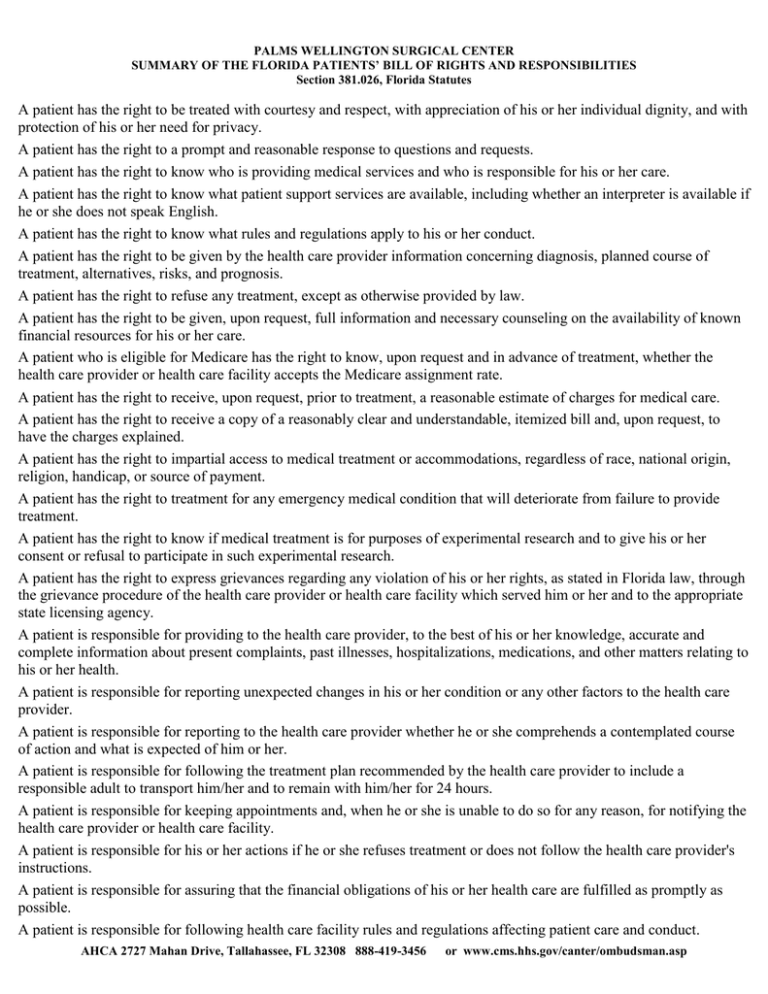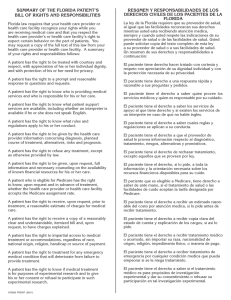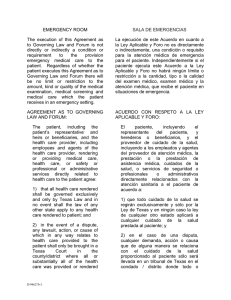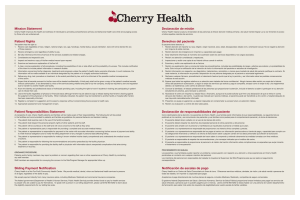A patient has the right to be treated with courtesy and respect, with
Anuncio

PALMS WELLINGTON SURGICAL CENTER SUMMARY OF THE FLORIDA PATIENTS’ BILL OF RIGHTS AND RESPONSIBILITIES Section 381.026, Florida Statutes A patient has the right to be treated with courtesy and respect, with appreciation of his or her individual dignity, and with protection of his or her need for privacy. A patient has the right to a prompt and reasonable response to questions and requests. A patient has the right to know who is providing medical services and who is responsible for his or her care. A patient has the right to know what patient support services are available, including whether an interpreter is available if he or she does not speak English. A patient has the right to know what rules and regulations apply to his or her conduct. A patient has the right to be given by the health care provider information concerning diagnosis, planned course of treatment, alternatives, risks, and prognosis. A patient has the right to refuse any treatment, except as otherwise provided by law. A patient has the right to be given, upon request, full information and necessary counseling on the availability of known financial resources for his or her care. A patient who is eligible for Medicare has the right to know, upon request and in advance of treatment, whether the health care provider or health care facility accepts the Medicare assignment rate. A patient has the right to receive, upon request, prior to treatment, a reasonable estimate of charges for medical care. A patient has the right to receive a copy of a reasonably clear and understandable, itemized bill and, upon request, to have the charges explained. A patient has the right to impartial access to medical treatment or accommodations, regardless of race, national origin, religion, handicap, or source of payment. A patient has the right to treatment for any emergency medical condition that will deteriorate from failure to provide treatment. A patient has the right to know if medical treatment is for purposes of experimental research and to give his or her consent or refusal to participate in such experimental research. A patient has the right to express grievances regarding any violation of his or her rights, as stated in Florida law, through the grievance procedure of the health care provider or health care facility which served him or her and to the appropriate state licensing agency. A patient is responsible for providing to the health care provider, to the best of his or her knowledge, accurate and complete information about present complaints, past illnesses, hospitalizations, medications, and other matters relating to his or her health. A patient is responsible for reporting unexpected changes in his or her condition or any other factors to the health care provider. A patient is responsible for reporting to the health care provider whether he or she comprehends a contemplated course of action and what is expected of him or her. A patient is responsible for following the treatment plan recommended by the health care provider to include a responsible adult to transport him/her and to remain with him/her for 24 hours. A patient is responsible for keeping appointments and, when he or she is unable to do so for any reason, for notifying the health care provider or health care facility. A patient is responsible for his or her actions if he or she refuses treatment or does not follow the health care provider's instructions. A patient is responsible for assuring that the financial obligations of his or her health care are fulfilled as promptly as possible. A patient is responsible for following health care facility rules and regulations affecting patient care and conduct. AHCA 2727 Mahan Drive, Tallahassee, FL 32308 888-419-3456 or www.cms.hhs.gov/canter/ombudsman.asp PALMS WELLINGTON SURGICAL CENTER RESUMEN DE LA DECLARACIÓN DE LOS DERECHOS Y LAS RESPONSABILIDADES DE LOS PACIENTES DE LA FLORIDA Section 381.026, Florida Statutes El paciente tiene el derecho de que se le trate con respeto y cortesía, reconociendo su dignidad indiviual y protegiendo su necesidad a la privacidad. El paciente tiene el derecho de que se le contesten sus preguntas y se responda a sus deseos rápida y razonablemente. El paciente tiene el derecho de saber quién le provee servicios médicos y quién se responsabiliza por su cuidado. El paciente tiene el derecho de saber qué servicios de apoyo existen para el paciente, incluso el saber si hay un intérprete a su disposición si no habla inglés. El paciente tiene el derecho de saber qué reglas y reglamentos conciernen su conducta. El paciente tiene el derecho de que su proveedor de cuidados de salud le dé información respecto al diagnóstico, planes de curso de tratamiento, alternativas, riesgos y pronósticos. El paciente tiene el derecho de rehusarse a recibir tratamiento, excepto en casos prescritos por la ley. El paciente tiene el derecho de recibir, si lo pide, información completa y el asesoramiento necesario sobre la existencia de recursos financieros conocidos para ayudar con su cuidado. El paciente que tiene elegibilidad para recibir Medicare, tiene el derecho de saber, si lo solicita y, antes de recibir tratamiento, si su proveedor de cuidados de salud o la instalación de cuidados de salud aceptan la tasa de pagos establecida por Medicare. El paciente tiene el derecho de recibir, si lo solicita y, antes de recibir tratamiento, un estimado razonable de lo que se le va a cobrar por el cuidado médico. El paciente tiene el derecho de recibir una copia razonablemente clara y comprensible de una cuenta detallada y, si lo solicita, una explicación de los cobros. El paciente tiene el derecho de tener acceso a tratamiento médico o a instalaciones para recibirlo de forma imparcial sin que se considere raza, origen nacional, religión, impedimento físico o proveniencia del pago. El paciente tiene el derecho de que se le dé tratamiento de emergencia para cualquier estado de salud que puede deteriorarse si no se le da tratamiento. El paciente tiene el derecho de saber si el tratamiento que se le ofrece tiene como próposito llevar a cabo investigaciones experimentales y consentir o rehusarse a participar en dicho tratamiento. El paciente tiene el derecho de expresar sus quejas sobre cualquier violación de sus derechos, tal como aparece en las leyes de la Florida, a través del proceso de quejas del proveedor de cuidados de salud o del lugar que proveyó esos cuidados y con la agencia del estado que expide las licencias apropiadas. El paciente tiene la responsabilidad de proporcionarle al proveedor de cuidados de salud, al límite de sus mejores conocimientos, información completa y correcta sobre sus quejas presentes, enfermedades pasadas, estadías en el hospital, medicamentos y otras cuestiones relacionadas con su salud. El paciente tiene la responsabilidad de informar al proveedor de cuidados de salud de cambios inesperados en su condición física o cualquier otro factor. El paciente tiene la responsabilidad de informar al proveedor de cuidados de salud si comprende la manera en que se procederá y lo que se espera que él o ella haga. El paciente tiene la responsabilidad de seguir el plan de tratamiento recomendado por el proveedor de cuidados de salud. Esto incluye un adulto responsabilidad para transportar al paciente y acompanarlo por 24 horas. El paciente tiene la responsabilidad de ir a sus citas y, si no puede ir por cualquier razón, de notificar al proveedor de cuidados de salud o a la instalación de cuidados de salud. El paciente tiene la responsabilidad de aceptar los resultados de sus acciones si rehusa tratamiento o si no sigue las instrucciones del proveedor de cuidados de salud El paciente tiene la responsabilidad de asegurarse de que las obligaciones financieras relacionadas con sus cuidados de salud se cumplan tan pronto como sea posible. El paciente tiene la responsabilidad de seguir las reglas y reglamentos de la instalación de cuidados de salud que tienen que ver con la conducta y cuidado de los pacientes. AHCA 2727 Mahan Drive, Tallahassee, FL 32308 888-419-3456 or www.cms.hhs.gov/canter/ombudsman.asp


